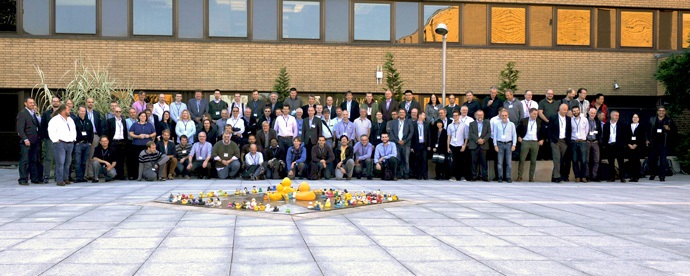ECMWF | Reading | 24-28 September 2018

Workshop description
Every second year ECMWF hosts a workshop on the use of high performance computing in meteorology. High performance computer architectures are becoming ever more complex which presents significant challenges for the ongoing development of operational meteorological applications.
The 18th workshop on high performance computing in meteorology took place at ECMWF, Reading, UK, 24-28 September 2018.
This workshop looked especially at scalability and I/O of weather and climate applications on HPC systems.
In particular we invited presentations addressing the following topics related to weather and climate applications:
-
Modelling mathematics and numerical methods
-
Programming models and domain-specific languages (DSL)
-
High performance I/O and post-processing
-
Operational use of HPC in weather and climate
-
Machine learning and data analytics
-
Large dataset visualisation
Workshop aims
Our aim is to provide a venue where users from our Member States and around the world can report on their experience and achievements in the field of high performance computing during the last two years; plans for the future and requirements for computing power were also presented.
Presentations
Monday 24 September
|
ECMWF’s research directions |
|
|
High resolution simulations with ICON |
|
|
DWD's operational roadmap: Implications for computation, data management and data analysis |
|
|
Computational aspects and performance evaluation of the IFS-XIOS integration |
|
|
Looking towards the future - NCAR’s computing and storage |
|
|
Met Office HPC update |
|
|
Variational ensemble Kalman smoothing |
Tuesday 25 September
|
Keynote address: How Arm's entry into the HPC market might affect meteorological codes |
|
|
Progress report on ECMWF's scalability programme |
|
|
The European HPC strategy and implementation |
|
|
Building computing and data centres for ExaScale in the EU |
|
|
Energy-efficient Scalable Algorithms for Weather Prediction at Exascale (ESCAPE) |
|
|
ESiWACE, the Center of Excellence for Climate and Weather Simulation in Europe |
|
|
EPiGRAM-HS: Programming Models for Heterogenous Systems at Exascale |
|
|
The NextGenIO project |
|
|
Towards Enabling Memory- and Data-Aware HPC |
|
|
Panel : European research roadmap towards Exascale |
N/A |
Wednesday 26 September
|
Keynote address: Tackling the Simulation and Analysis Frontiers of Atmospheric and Earth System Science |
|
|
Improving satellite data utilization through deep learning |
|
|
An update of HPC at the JMA |
|
|
The Influence of Exascale Architectures on Earth System Modeling in NASA |
|
|
Performance Study of Climate and Weather Models: Towards a More Efficiently Operational IFS |
|
|
Modernizing U. S. Navy NWP Operations: Toward Distributed HPC |
|
|
Supercomputing at the US National Weather Service |
|
|
Premier implementation of GRAPES-GLB on Sunway Taihu Light |
|
|
Reduced precision computing for weather and climate models |
|
|
Variable-resolution weather and climate modeling using GFDL FV3 |
|
|
Developing NEPTUNE on HPC for U.S. Naval Weather Prediction |
|
Thursday 27 September
|
Keynote address: A (c)loud revolution in weather and climate research |
|
|
Towards a new dynamical kernel in GEM |
|
|
An Update of CMA HPC System |
|
|
NOAA exascale computing project |
|
|
Modernizing Scientific Software Development |
|
|
OMNI/O: A Tool for I/O Recording, Analysis, and Replay |
|
|
Running ARPEGE-NH at 2.5km |
|
|
Overcoming Storage Issues of Earth-System Data with Intelligent Storage Systems |
|
|
Panel: Convergence of HPC and the Cloud |
N/A |
Friday 28 September
|
Prototyping an in-situ visualisation mini-app for the LFRic project |
|
|
FPGA Acceleration of the LFRic Weather and Climate Model in the EuroExa Project Using Vivado HLS |
|
|
Accelerating Weather Prediction with NVIDIA GPUs |
|
|
Optimisation of Data Movement in Complex Workflows |
|
|
WRF-GO: a workflow manager for meteo predictions and applications |
|
|
Implications of moving towards a Continuous Data Assimilation system |
|
